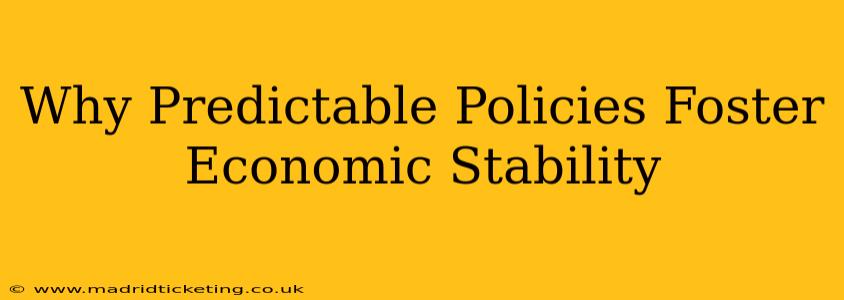Economic stability is the cornerstone of a thriving society. It fosters investment, creates jobs, and improves the overall well-being of citizens. But what drives this stability? While many factors contribute, one crucial element often overlooked is the importance of predictable government policies. When governments implement consistent and transparent policies, businesses and individuals can make informed decisions, leading to a more stable and prosperous economy. This article will delve into the reasons why predictable policies are so vital for economic stability, addressing common questions and concerns along the way.
What are Predictable Policies?
Predictable policies refer to government actions and regulations that are consistent, transparent, and easily understood. This means that changes in policy are made gradually, with ample opportunity for public input and discussion. They avoid sudden shifts or reversals that can destabilize markets and investor confidence. Predictability doesn't imply unchanging policies; rather, it suggests a framework where changes are communicated clearly and implemented in a measured manner. This allows businesses and individuals to adapt and plan for the future with greater certainty.
How Do Predictable Policies Promote Investment?
Predictability reduces risk. Investors are inherently risk-averse. When policies are unpredictable, investors face uncertainty about the future regulatory environment and potential returns on their investments. This uncertainty can lead to a decrease in investment, hindering economic growth. Conversely, predictable policies signal a stable and reliable investment climate, encouraging both domestic and foreign investment.
What is the Relationship Between Predictable Policies and Job Creation?
Stable business environment fosters job growth. Predictable policies create a more stable business environment. Businesses are more likely to hire and expand when they are confident about the long-term regulatory landscape. Unpredictable policies, on the other hand, can lead to uncertainty and reluctance to invest in expansion or new hires, resulting in stagnant job growth or even job losses.
Don't Predictable Policies Stifle Innovation?
This is a common misconception. While some argue that unpredictable policies can spur innovation by forcing businesses to adapt quickly, the reality is that excessive uncertainty can be detrimental. Predictable policies provide a stable framework within which innovation can thrive. Businesses can invest in research and development knowing that the regulatory environment is unlikely to undergo drastic changes overnight. Clear regulations can also help level the playing field, preventing unfair competition and encouraging innovation across different sectors.
How Do Predictable Policies Affect Consumer Confidence?
Stability breeds confidence. When consumers are confident in the economy's stability, they are more likely to spend money, boosting demand and driving economic growth. Predictable policies contribute significantly to this consumer confidence. Knowing that the government is pursuing consistent and transparent policies reduces uncertainty about the future, leading to increased consumer spending and investment.
What are the Examples of Unpredictable Policies and Their Consequences?
Numerous historical examples demonstrate the negative consequences of unpredictable policies. Sudden changes in tax laws, unexpected regulatory shifts, and frequent changes in leadership can all create instability. For instance, a sudden increase in import tariffs can disrupt supply chains and lead to price increases, harming businesses and consumers alike. Similarly, frequent changes in environmental regulations can create uncertainty for businesses operating in environmentally sensitive industries.
How Can Governments Ensure Policy Predictability?
Governments can foster predictable policies through several mechanisms:
- Transparency: Openly communicating policy goals, processes, and timelines.
- Public consultation: Seeking input from stakeholders before implementing significant changes.
- Phased implementation: Introducing policy changes gradually to allow for adaptation.
- Long-term planning: Developing comprehensive strategies that extend beyond short-term political cycles.
- Independent regulatory bodies: Establishing institutions that operate independently of political influence to ensure consistency in regulation.
In conclusion, predictable policies are not just a theoretical ideal but a practical necessity for achieving economic stability. By fostering investment, creating jobs, boosting consumer confidence, and providing a framework for innovation, predictable policies pave the way for a more prosperous and resilient economy. While flexibility is necessary to adapt to changing circumstances, a commitment to transparency and consistency in government actions is the bedrock of sustainable economic growth.

